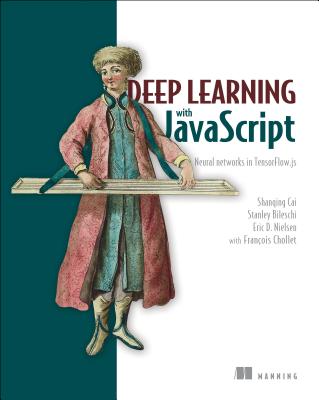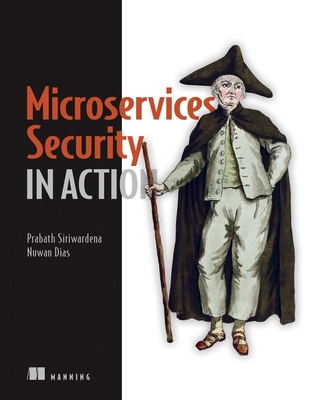買這商品的人也買了...
-
 $2,280Working Effectively with Legacy Code (Paperback)
$2,280Working Effectively with Legacy Code (Paperback) -
 Spring in Action, 4/e (Paperback)
Spring in Action, 4/e (Paperback)$1,870$1,777 -
 Getting Started with Bluetooth Low Energy: Tools and Techniques for Low-Power Networking (Paperback)
Getting Started with Bluetooth Low Energy: Tools and Techniques for Low-Power Networking (Paperback)$1,520$1,440 -
 Arduino 官方正版 Genuino 101
Arduino 官方正版 Genuino 101$1,700$1,700 -
 Raspberry Pi 3 Model B+ (UK製)
Raspberry Pi 3 Model B+ (UK製)$4,620$4,389 -
 JVM Performance Engineering: Inside OpenJDK and the HotSpot Java Virtual Machine (Paperback)
JVM Performance Engineering: Inside OpenJDK and the HotSpot Java Virtual Machine (Paperback)$1,980$1,881 -
 Intro to Bluetooth Low Energy: The Easiest Way to Learn Ble (Paperback)
Intro to Bluetooth Low Energy: The Easiest Way to Learn Ble (Paperback)$1,230$1,169 -
 晉昇軟體最高殿堂:Jenkins2 持續整合大師之路
晉昇軟體最高殿堂:Jenkins2 持續整合大師之路$600$510 -
 Deep Learning with JavaScript: Neural Networks in Tensorflow.Js
Deep Learning with JavaScript: Neural Networks in Tensorflow.Js$1,650$1,568 -
 JavaScript 技術手冊
JavaScript 技術手冊$560$420 -
 Building a Future-Proof Cloud Infrastructure: A Unified Architecture for Network, Security and Storage Services (Paperback)
Building a Future-Proof Cloud Infrastructure: A Unified Architecture for Network, Security and Storage Services (Paperback)$2,010$1,910 -
 Microservices Security in Action
Microservices Security in Action$1,980$1,881 -
 Java SE 14 技術手冊
Java SE 14 技術手冊$680$537 -
 區塊鏈生存指南:帶你用 Python 寫出區塊鏈!(iT邦幫忙鐵人賽系列書)
區塊鏈生存指南:帶你用 Python 寫出區塊鏈!(iT邦幫忙鐵人賽系列書)$520$406 -
 Parallel and High Performance Computing (Paperback)
Parallel and High Performance Computing (Paperback)$2,450$2,328 -
 $1,663Continuous Architecture in Practice: Software Architecture in the Age of Agility and Devops (Paperback)
$1,663Continuous Architecture in Practice: Software Architecture in the Age of Agility and Devops (Paperback) -
 $1,368Domain Storytelling: A Collaborative, Visual, and Agile Way to Build Domain-Driven Software (Paperback)
$1,368Domain Storytelling: A Collaborative, Visual, and Agile Way to Build Domain-Driven Software (Paperback) -
 $2,070Multithreaded JavaScript: Concurrency Beyond the Event Loop
$2,070Multithreaded JavaScript: Concurrency Beyond the Event Loop -
 $2,475Software Architecture: The Hard Parts: Modern Trade-Off Analyses for Distributed Architectures (Paperback)
$2,475Software Architecture: The Hard Parts: Modern Trade-Off Analyses for Distributed Architectures (Paperback) -
 Structure and Interpretation of Computer Programs: JavaScript Edition (Paperback)
Structure and Interpretation of Computer Programs: JavaScript Edition (Paperback)$2,625$2,573 -
 $2,052Mastering API Architecture: Design, Operate, and Evolve Api-Based Systems (Paperback)
$2,052Mastering API Architecture: Design, Operate, and Evolve Api-Based Systems (Paperback) -
 Functional and Concurrent Programming: Core Concepts and Features
Functional and Concurrent Programming: Core Concepts and Features$2,160$2,052 -
 $1,758Functional Design: Principles, Patterns, and Practices (Paperback)
$1,758Functional Design: Principles, Patterns, and Practices (Paperback) -
 OpenTelemetry 入門指南:建立全面可觀測性架構(iThome鐵人賽系列書)【軟精裝】
OpenTelemetry 入門指南:建立全面可觀測性架構(iThome鐵人賽系列書)【軟精裝】$750$585 -
 Learning Systems Thinking: Essential Nonlinear Skills and Practices for Software Professionals (Paperback)
Learning Systems Thinking: Essential Nonlinear Skills and Practices for Software Professionals (Paperback)$2,043$1,935
相關主題
商品描述
The message from educators, the tech community, and even politicians is clear: everyone should learn to code. To emphasize the universality and importance of computer programming, promoters of coding for everyone often invoke the concept of "literacy," drawing parallels between reading and writing code and reading and writing text. In this book, Annette Vee examines the coding-as-literacy analogy and argues that it can be an apt rhetorical frame. The theoretical tools of literacy help us understand programming beyond a technical level, and in its historical, social, and conceptual contexts. Viewing programming from the perspective of literacy and literacy from the perspective of programming, she argues, shifts our understandings of both. Computer programming becomes part of an array of communication skills important in everyday life, and literacy, augmented by programming, becomes more capacious.
Vee examines the ways that programming is linked with literacy in coding literacy campaigns, considering the ideologies that accompany this coupling, and she looks at how both writing and programming encode and distribute information. She explores historical parallels between writing and programming, using the evolution of mass textual literacy to shed light on the trajectory of code from military and government infrastructure to large-scale businesses to personal use. Writing and coding were institutionalized, domesticated, and then established as a basis for literacy. Just as societies demonstrated a "literate mentality" regardless of the literate status of individuals, Vee argues, a "computational mentality" is now emerging even though coding is still a specialized skill.











